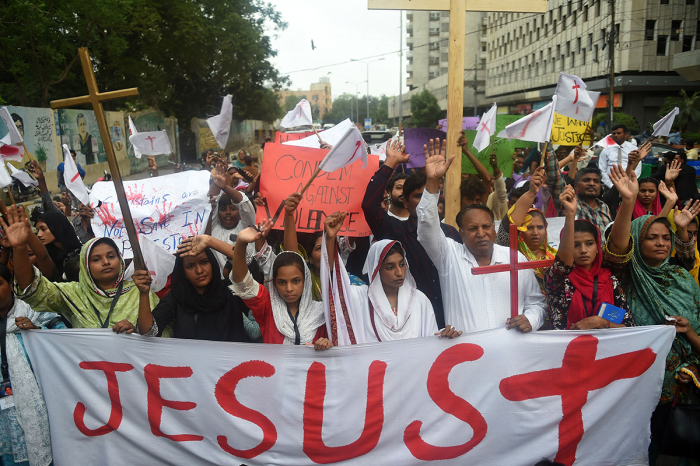85 people accused of blasphemy murdered before cases heard in court

LAHORE, Pakistan — A coalition of 17 international human rights organizations is demanding Pakistan be suspended from the Commonwealth of Nations due its blasphemy laws and other rights violations, but local activists said that could result in more hardship for religious minorities.
The coalition sent an open letter to the Commonwealth Secretariat ahead of the Commonwealth Heads of Government Meeting in Samoa on Oct. 21-26, signed by groups including Human Rights Without Frontiers, Bitter Winter, the European Association for the Defense of Minorities, the Center for Studies on Freedom of Religion Belief and Conscience, the European Federation for Freedom of Belief and Jubilee Campaign.
It emphasizes how the country’s controversial blasphemy laws have been used to falsely accuse and persecute people, leading to widespread violence, extrajudicial killings and unlawful detentions. The letter argues that these actions violate the core values of the Commonwealth Charter, which promotes democracy, human rights and equality for all citizens.
The letter highlights Pakistan’s failure to reform its blasphemy laws, stating that while no state-sanctioned executions have occurred, vigilante justice and mob violence have become rampant. It cites at least 85 cases of people accused of blasphemy being murdered before their cases could be heard in court, with many involving public lynchings and mob attacks.
“The Pakistani government’s inaction has resulted in the deaths of many innocent people, and its refusal to reform these oppressive laws contradicts the values espoused by the Commonwealth,” stated Willy Fautré, director of Human Rights Without Frontiers.
The letter stresses that law enforcement officials often turn a blind eye to these crimes, which further emboldens perpetrators of violence. It also recalls Pakistan’s previous suspensions from the Commonwealth — first from 1999 to 2004 and again from 2007 to 2008 — due to issues of governance and human rights abuses.
Stating that the current situation warrants similar decisive action, the signatories called on the Commonwealth to pressure Pakistan into ending its institutional persecution of religious minorities and taking steps to protect citizens from unjust accusations and violence.
“The Commonwealth cannot stand by as one of its member states systematically violates the rights of its people,” stated Alessandro Amicarelli, chairman of the European Federation for Freedom of Belief. “Suspending Pakistan is a necessary step to uphold the organization’s commitment to human rights.”
Despite international condemnation and mounting pressure, the government of Pakistan has resisted calls to amend its blasphemy laws or introduce safeguards to protect religious minorities, it said, adding that the continuation of these laws poses a serious threat not only to religious minorities but to Pakistan’s standing as a member of the Commonwealth.
Opposition to suspension
Human rights and social activists in Pakistan said suspension of Pakistan from the Commonwealth of Nations was unlikely to curb human rights abuses in the country.
Instead, it could have negative implications for religious minorities, they said.
Minorities Alliance Pakistan (MAP) Chairman Akmal Bhatti said human rights in Pakistan have deteriorated to an alarming level, “but any suspension or sanctions on Pakistan would ultimately hurt the vulnerable communities.”
“Pakistan is already facing huge economic challenges, and any international action on behalf of religious minorities that results in economic implications on the country would have a negative impact on the people, especially the poor Christian community,” Bhatti told Christian Daily International-Morning Star News.
Such an action could also affect advocacy efforts in Pakistan, he said.
“Several churches and Christian organizations are already facing problems in receiving foreign funding due to stringent monitoring by the government,” Bhatti said. “Suspension of Pakistan on the basis of its human rights record will cause more harm than good to our people.”
The international community should pressure Pakistan through dialogue to improve the situation on the ground, he said.
“The government should be pressured to curb false allegations of blasphemy and prosecute perpetrators of mob violence; it should also criminalize forced conversions of minority girls and ensure the protection of its religious minorities,” he said.
Samson Salamat, chairman of the Rwadari Tehreek (Movement for Equality), echoed Bhatti’s concerns regarding the open letter.
“It is unfortunate and depressing that the state apparatus and the responsible government functionaries in the successive governments have failed to understand the level of threat the blasphemy laws have brought on to the citizens, particularly those belonging to the minority communities,” Salamat told Christian Daily International-Morning Star News. “Everyone in Pakistan is compelled to live a life of fear.”
Salamat said that the pleas of religious minorities’ leadership to the state have fallen on deaf ears.
“Our only hope is pressure exerted by the international community, media, and human rights bodies,” he said. “However, we are also apprehensive that this open letter may result in the targeting of active leadership of the religious minorities by the government and state agencies.”
Naeem Yousaf Gill, executive director of the Catholic Church’s human rights advocacy arm, the National Commission for Justice and Peace (NCJP), said that suspension of Pakistan’s membership couldn’t guarantee a halt to the misuse of blasphemy laws and violations of minorities’ rights.
“The need is to pressure the government of Pakistan to own its minorities as first-class citizens,” Gill said. “It should take strict action against any violation of their rights and should ensure that they are enjoying an equal and better life in Pakistan.”
Originally published at Christian Daily International–Morning Star News








